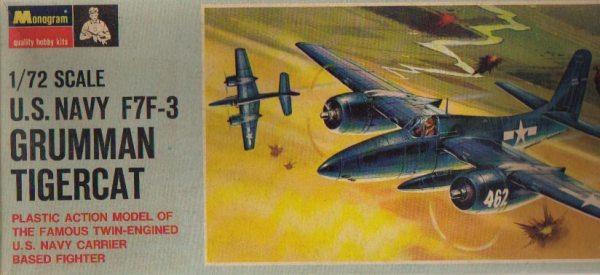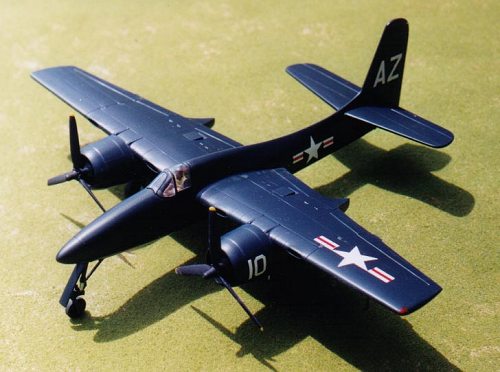
Monogram 1/72 F7F Tigercat
|
KIT # |
PA 163 |
|
PRICE: |
$1.00 back in the late 60's |
|
DECALS: |
One aircraft |
|
REVIEW : |
|
|
NOTES: |

|
BACKGROUND |
Monogramís Tigercat dates back to 1967. When Monogram entered the 1/72 arena
that
was at that time dominated by Airfix and Revell, they raised the bar, and this
kit was one
that helped do it (along with the F8F, P-51B, and Bf 110).

|
THE KIT |
The variant represented is the big-tailed F7F-3 (IMHO, one of the prettiest
twin-prop
airplanes ever built), and the completed model really looks like one in every
way. Parts
breakdown is very conventional, and parts fit is good. If you use liquid cement
and build
carefully, you might be able to get away with no putty at all. The framing on
the
well-shaped, very clear canopy is gorgeous.
Weak points are minor and few. Surface detailing is fine raised lines. Thereís
not much of
a cockpit, and even less in the wheel wells. The propeller blades seem to be a
bit fat in
thickness, and a bit thin in chord. They look okay, but replace them with better
props from
a pair of Hellcat or Corsair kits if you want to get nitpicky about it. The
engines, such as
they are, are molded as part of the cowlings, but theyíre nice and deep and
hidden in the
shadows.
One problem with any Tigercat kit is the typeís tendency to tail-sit. Pack as
much weight
as you can get in the nose of the Monogram F7F--youíll need it. I have not one
but two
158-grain .357 Magnum bullets (total over 1/2 ounce) in the nose of mine and
thatís only
barely enough. Stomp through my model display room and my Tigercat will rock
back on
its tail. You might even need some weight in the nacelles. Normally I advise
against this,
because it stresses the main gear and the wing joints for a relatively small
amount of effect,
but the wing joints and the main struts are both sturdy in this kit. If itís
any consolation,
the real Tigercats liked to tail-sit, too, and several pictures of them so
parked have been
published.
 The Monogram Tigercat has been reissued in several boxes, and most recently
marketed
by Revell of Germany. It doesnít seem to be in production at this time, but it
comes and
goes. It can also be found at swap meets and on eBay, but in any case prepare to
pay a
good deal more than its original late-í60s price of $1.00. Whatever it costs,
itís worth it,
as itís the only game in town. Aoshima of Japan had one years ago; Iíve never
seen that
kit and canít comment on it. (It is a very nice kit and does an early
-1 as well. If you can find it and like Tigercats, buy it! Ed.)
The Monogram Tigercat has been reissued in several boxes, and most recently
marketed
by Revell of Germany. It doesnít seem to be in production at this time, but it
comes and
goes. It can also be found at swap meets and on eBay, but in any case prepare to
pay a
good deal more than its original late-í60s price of $1.00. Whatever it costs,
itís worth it,
as itís the only game in town. Aoshima of Japan had one years ago; Iíve never
seen that
kit and canít comment on it. (It is a very nice kit and does an early
-1 as well. If you can find it and like Tigercats, buy it! Ed.)
The model shown is one I originally built in high school and painted with Pactra
Royal
Blue in the rattlecan. A few years ago I dug it out of the attic, disassembled
it as much as I
could, stripped the paint with Easy-Off oven cleaner, reassembled it, and
repainted it in
Model Master Glossy Sea Blue. I used old MicroScale generic decals to replicate
a Marine
Tigercat shown in Squadron/Signalís F7F Tigercat in Action book. (Kit decals for
this
issue are for an F7F with factory delivery number 462 on the engine cowlings, as
seen in a
well-known and often-reproduced photograph. I donít know what decals are in
other
boxings, sorry. While Iím apologizing, Iím also sorry that the kit box didnít
quite fit into
my scanner by about a quarter of an inch.)
|
CONSTRUCTION |
This kit is easy enough for a kid or beginner to build, yet good enough for the most advanced modeler to lavish whatever attention he wishes on it--rescribe it, scratchbuild details, add all the aftermarket stuff you want. Conversion to the smaller-tailed F7F-2 should be a piece of cake. Building either the F7F-2N or -3N night fighter will require that you be able to scratchbuild a rear canopy, and the F7F-3N night fighter of Korean War use will of course need a new nose. And we couldnít leave the subject of Tigercats without mentioning the retina-searing paint schemes you can do if you choose to model one of the firefighting ďborate bombersĒ of the Ď60s and Ď70s. Wonderful stuff!
|
CONCLUSIONS |
As this is written, there are rumors that a new 1/72 Tigercat kit will be coming
soon from
a European manufacturer. No word yet on what variant--letís hope for the F7F-3N.
To be
better than the Monogram, the new kit will have to have engraved detail, full
cockpit, full
engines, etc.--and it will probably sell for at least twice as much as any
Monogram/Revell/RoG reissue would. But no matter how good the new kit (if it
materializes at all) turns out to be, it wonít change the fact that the Monogram
Tigercat is
a nice little kit--always was, always will be! Model on!
 BONUS PIC
BONUS PIC
Hereís a special treat for those of you whoíve read this far: This is the engine
of a
beautifully restored F7F-3 that I took at an air show a couple years ago. Note
the shape of
the base of the prop blades. Now, if you have it, dig out an AMT 1/48 Tigercat
kit and
compare the props. Be prepared for a nasty surprise!
Copyright ModelingMadness.com. All rights reserved. No reproduction in part or in whole without express permission.
If you would like your product reviewed fairly and fairly quickly, please contact the editor or see other details in the Note to Contributors.